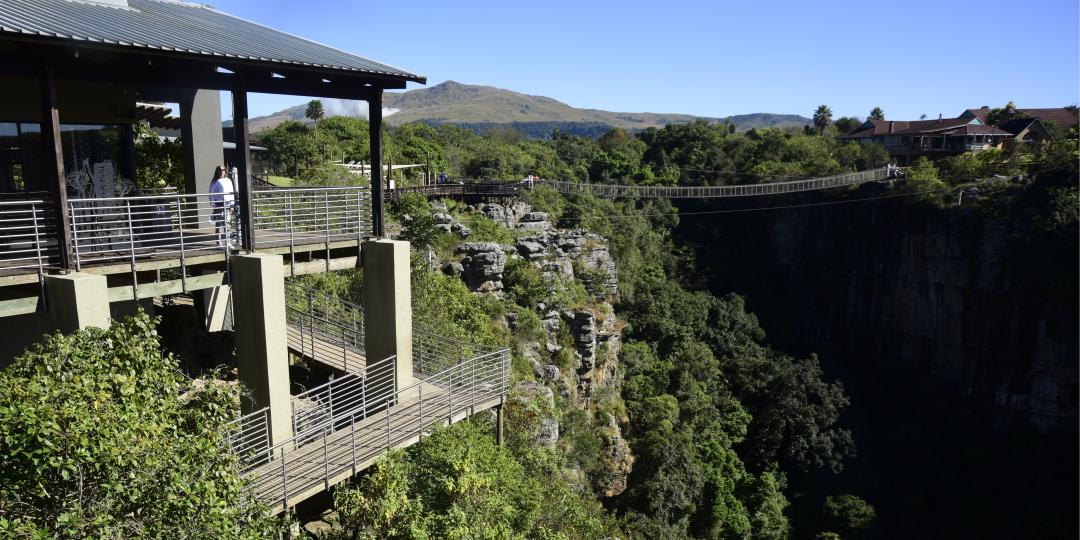South Africa’s Tourism Transformation Fund (TTF) is making strides in assisting black-owned tourism businesses, having so far provided support to 23 projects valued at R272.6 million (€13.7m), with potential to create in excess of 1 000 jobs.
Launched in 2017 through the Department of Tourism (DoT) and the National Empowerment Fund (NEF), the TTF provides a combination of grant funding, debt financing and equity contributions to facilitate investment in the tourism sector by black entrepreneurs. Any support for qualifying small enterprises is dependent on an assessment of the commercial viability of the proposed project.
Representatives from the DoT (led by Deputy Minister Fish Mahlalela) and the NEF unpacked the fund’s impacts at an event at Graskop Gorge Lift Company – the first business to receive TTF support – on Mpumalanga’s Panorama Route on Thursday, May 23.
Of the 23 projects supported by the fund – including lodges, hotels, Graskop Gorge Lift and a venue hire company – six are operational and a further six are in the construction phase. These are geographically spread across rural and urban areas in Mpumalanga, the Eastern Cape, KwaZulu Natal, the Northern Cape, Limpopo, Gauteng and the Free State (see tables below).


Ten other approved transactions are scheduled to commence construction, while one project was liquidated due to difficult trading conditions.
The approved projects represent a total of 76% women ownership and 27% youth ownership.
Nare Leisure Limited, a 100% black women-owned company in the Northern Cape, was provided with funding of R11.7m (€585 000), including a R6.7m (€335 000) loan from the NEF and a R5m (€250 000) TTF grant, for the construction of the Nare Boutique Hotel in Kimberley.
Owner Nontuthuzelo Mogoje intends to expand current operations through the development of a 29-bedroom four-star boutique hotel in Upington, requiring funding of R32.8m (€1.64m) for the acquisition of land, renovations of existing structures and working capital.
“The vision is to ultimately create a successful black women-owned hotel group that can compete in the untransformed Upington tourism market. This transformative project will spur business activity through local spend, as well as create 29 permanent jobs and at least 60 temporary jobs,” said Mogoje.
The Graskop Gorge Lift Company received R38m (€1.9m) in financing from the NEF and a R5m TTF grant. The adventure attraction features a glass-walled elevator that takes visitors 51 metres to the forest floor, a zipline, suspension bridge, shops and dining venues. Co-owned by well-known industry figure Oupa Pilane, the business has been revitalising for the region, attracting 195 000 visitors last year.
Transformation moving at ‘snail’s pace’
Pilane stressed that the barriers to entry to the TTF needed to be lowered in order to achieve its over-arching aims.
“Millions still need to be contributed by the entrepreneurs for things like feasibility studies and municipal rezoning. As we look at speeding up the transformation of the tourism sector through major projects, we need to take cognisance of that.”
Mahlalela admitted that, although there had been some growth in the number of small and micro-enterprises entering the sector, and some progress made by existing large tourism players, transformation was moving at “snail’s pace”.
“All transformation efforts to date have not sufficiently changed the structure of the sector to facilitate equitable growth with sustained positive socio-economic impact for the people of South Africa.”
Mahlalela said the TTF had created a more direct funding mechanism for small black-owned enterprises struggling to access loans from traditional financial institutions.
“Tourists want authentic experiences that are both unique and sustainable. The partnership we are seeing shows that when the private and public sectors work together, this results not only in a more inclusive tourism landscape, but also in South Africa’s tourism economy becoming richer.”
Since its establishment in 1998, the NEF has approved over R40 billion (€2bn) for black entrepreneurs across various sectors, with R10 billion (€500m) disbursed, supporting the creation of over 10 000 jobs.
NEF Acting CEO Mziwabantu Dayimani promised that continued support would be given to the tourism sector.
“We will continue to invest in tourism. We have seen how the sector has grown and how it has taken off after COVID, and believe that there is an opportunity to create more jobs and to support projects in rural areas.”
























